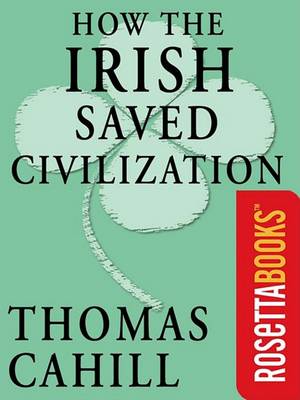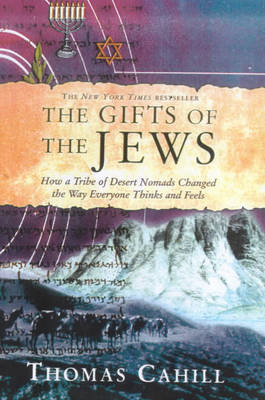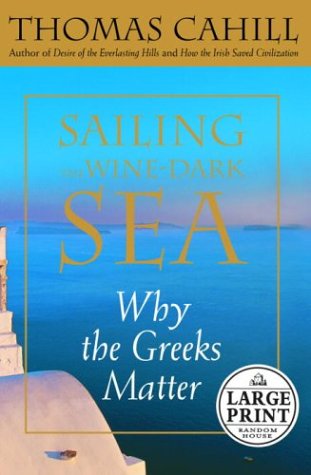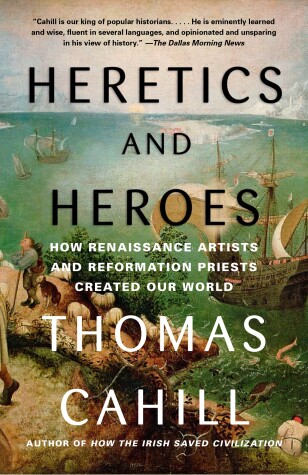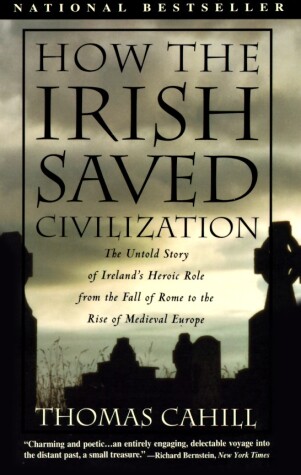Hinges of History
5 primary works • 7 total works
Book 1
Book 2
Book 4
In the city-states of Athens and Sparta and throughout the Greek islands, honors could be won in making love and war, and lives were rife with contradictions. By developing the alphabet, the Greeks empowered the reader, demystified experience, and opened the way for civil discussion and experimentation—yet they kept slaves. The glorious verses of the Iliad recount a conflict in which rage and outrage spur men to action and suggest that their “bellicose society of gleaming metals and rattling weapons” is not so very distant from more recent campaigns of “shock and awe.” And, centuries before Zorba, Greece was a land where music, dance, and freely flowing wine were essential to the high life. Granting equal time to the sacred and the profane, Cahill rivets our attention to the legacies of an ancient and enduring worldview.
Book 5
After the long period of decline known as the Dark Ages, medieval Europe experienced a rebirth of scholarship, art, literature, philosophy, and science and began to develop a vision of Western society that remains at the heart of Western civilization today, from the entry of women into professions that had long been closed to them to the early investigations into alchemy that would form the basis of experimental science. On visits to the great cities of Europe-monumental Rome; the intellectually explosive Paris of Peter Abelard and Thomas Aquinas; the hotbed of scientific study that was Oxford; and the incomparable Florence of Dante and Giotto-acclaimed historian Thomas Cahill brilliantly captures the spirit of experimentation, the colorful pageantry, and the passionate pursuit of knowledge that built the foundations for the modern world.
Book 6
This was an age in which whole continents and peoples were discovered. It was an era of sublime artistic and scientific adventure, but also of newly powerful princes and armies—and of unprecedented courage, as thousands refused to bow their heads to the religious pieties of the past. In these exquisitely written and lavishly illustrated pages, Cahill illuminates, as no one else can, the great gift-givers who shaped our history—those who left us a world more varied and complex, more awesome and delightful, more beautiful and strong than the one they had found.
How did an obscure rabbi from a backwater of the Roman Empire come to be the central figure in Western Civilization? Did his influence in fact change the world? These are the questions Thomas Cahill addresses in his subtle and engaging investigation into the life and times of Jesus.
Cahill shows us Jesus from his birth to his execution through the eyes of those who knew him and in the context of his time—a time when the Jews were struggling to maintain their beliefs under overlords who imposed their worldview on their subjects. Here is Jesus the loving friend, itinerate preacher, and quiet revolutionary, whose words and actions inspired his followers to journey throughout the Roman world and speak the truth he instilled—in the face of the greatest defeat: Jesus' crucifixion as a common criminal. Daring, provocative, and stunningly original, Cahill's interpretation will both delight and surprise.
Every year millions of Americans celebrate St. Patrick's Day, but they may not be aware of how great an influence St. Patrick was on the subsequent history of civilization. Not only did he bring Christianity to Ireland, he instilled a sense of literacy and learning that would create the conditions that allowed Ireland to become "the isle of saints and scholars" -- and thus preserve Western culture while Europe was being overrun by barbarians.
In this entertaining and compelling narrative, Thomas Cahill tells the story of how Europe evolved from the classical age of Rome to the medieval era. Without Ireland, the transition could not have taken place. Not only did Irish monks and scribes maintain the very record of Western civilization -- copying manuscripts of Greek and Latin writers, both pagan and Christian, while libraries and learning on the continent were forever lost -- they brought their uniquely Irish world-view to the task.
As Cahill delightfully illustrates, so much of the liveliness we associate with medieval culture has its roots in Ireland. When the seeds of culture were replanted on the European continent, it was from Ireland that they were germinated.
In the tradition of Barbara Tuchman's A Distant Mirror, How The Irish Saved Civilization reconstructs an era that few know about but which is central to understanding our past and our cultural heritage. But it conveys its knowledge with a winking wit that aptly captures the sensibility of the unsung Irish who relaunched civilization.
